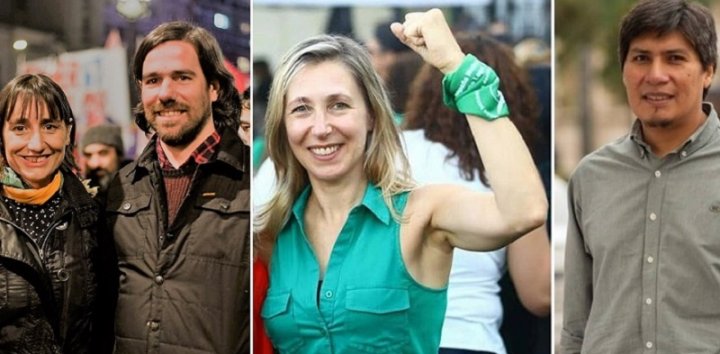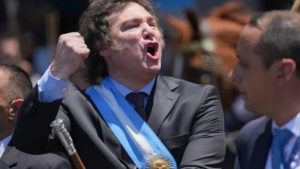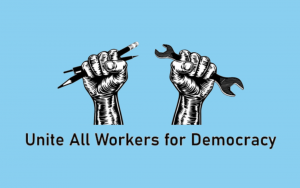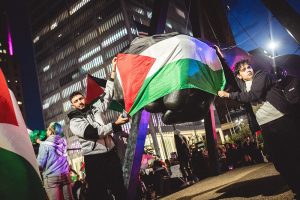The center-left government of Alberto Fernández and Cristina Kirchner suffered a defeat at Argentina’s midterm elections on Sunday. In 15 of the country’s 24 provinces, they lost to the right-wing coalition under former president Mauricio Macri. Besides losing both the city and the province of Buenos Aires, the governing coalition lost its majority in the Senate. The defeat was nonetheless less severe than had been expected after the primary elections in September.
The growing discontent with traditional parties was expressed in the exceptional performance of radical political alternatives. On the Far Right, the newly-formed Libertad Avanza (Freedom Advances) made gains in the capital city, where it received 17 percent. The neoliberal economist Javier Milei, whose supporters on election night were seen with Confederate flags, tried to build a profile by opposing corrupt elites.
Yet the Trumpian Right was blocked by a stronger performance of what in Argentina is known as the “Hard Left.” The Workers Left Front–Unity (FIT-U) got its best result since the coalition was formed in 2011. With 1,270,540 votes across the country, the Left Front is the third-largest political force in the country (although far behind the two bourgeois coalitions). Four Trotskyists will be taking up seats in Argentina’s National Congress: Nicolás del Caño and Romina del Plá for Buenos Aires Province, Myriam Bregman for the City of Buenos Aires, and Alejandro Vilca for Jujuy, in the far north. The FIT-U also won dozens of seats in provincial legislatures and city councils.
The Rise of the Left
The FIT-U is an electoral coalition composed of four Trotskyist groups. It was formed in 2011 as a defensive measure against a restrictive electoral reform that aimed to exclude small parties. Today it is made up of the Party of Socialist Workers (PTS), the Argentinean sister organization of Left Voice; the Workers’ Party (PO); Socialist Left (IS); and the Workers’ Socialist Movement (MST).
On Sunday, the Left Front had its best elections ever, with almost 1.3 million votes nationwide — or 6 percent of the 24 million people who voted. This included the FIT-U’s best-ever results in the Province of Buenos Aires (6.81 percent), the City of Buenos Aires (7.76 percent), Jujuy (25.1 percent), Chubut (8.54 percent), and Neuquén (8.19 percent). These results translate into four seats in the Chamber of Deputies, the lower house of congress. The FIT-U has had deputies since 2011 — they only take a workers’ wage and donate more than 80 percent of their salaries to a strike fund. These workers’ deputies are on the front lines of every struggle, and they are often hit by the rubber bullets and tear gas that the police fire on working people.
Some people might think that the radical Left would get votes only in middle-class neighborhoods. But the strongest support for the Left Front comes from the country’s poorest regions. For the first time, an indigenous worker will take a seat in Argentina’s congress. The sanitation worker Alejandro Vilca, a Kolla (an indigenous people of modern-day Argentina) and the son of a domestic worker, won a fourth of votes in Jujuy, securing one of just three seats for the province.
The FIT-U offered the only platform representing the interests of the working class: it demanded the expropriation of laboratories producing vaccines and the abolition of patents. To fight unemployment, it called for a six-hour workday without any loss in pay, which would distribute the available work to more people. The FIT-U was the only force that called for an immediate halt to payments for the foreign debt, which would allow for an immediate boost in social spending. It ran on explicitly socialist-feminist platform, with candidates who were on the front lines of the decades-long fight to legalize abortion.
Of the four organizations that make up the FIT-U, the PTS has taken on a leading role, which is why three of the four incoming deputies belong to that tendency. The PTS has been at the forefront of many of the most important episodes of class struggle in the past two decades in Argentina. From the occupation of the Zanon factory in 2001, to the Pepsico strike, the occupation of the Donnelley plant (now Madygraf, under workers’ control), and the involvement in land occupations such as in Guernica, the PTS is a dynamic factor in Argentina’s politics. With a presence in dozens of national unions and workplaces, the PTS is a reference point in the workers’ movement, fighting for a revolutionary anti-capitalist perspective.
Causes of the Peronist Defeat
Sunday marks the first time since the end of the military dictatorship that the Peronist movement, represented by Fernández and Kirchner, lost the Province of Buenos Aires and the Senate. It is not hard to find the causes for growing disillusion in the government. The long lockdown meant that tens of thousands of precarious workers were left without any income. At the beginning, the government offered emergency cash transfers for poor families, but this was rolled back toward the end of 2020. The government instead sent money to imperialist creditors as it opened new negotiations with the International Monetary Fund in the hope of refinancing the foreign debt.
Real wages have been sinking since 2015. Fernández came to power with promises to reverse the downward trend, but he largely continued the policies of his right-wing predecessor. The prices of food, utilities, and basic goods keep increasing. In the past year, inflation surpassed 50 percent, and the devaluation of the currency continues. While over 40 percent of the population lives in poverty, the government implemented austerity policies, cutting pensions and salaries.
Beyond the economic crisis, there were political scandals that undermined support for the government. In early 2021, vaccines were very scarce and restricted to high-risk people. Yet many politicians and their friends received shots, even though they did not qualify. In August, in the middle of a lockdown, photos surfaced of a maskless birthday party for Fernández’s partner at the presidential residence. These and other scandals eroded the government’s popularity as the pandemic dragged on.
Crisis, Divisions, and Opportunities
The ongoing economic crisis and the upcoming deadlines for payments to the IMF pose a tough challenge for the Peronist coalition. The movement that claims the legacy of Juan Perón (1895–1974) occupies a big chunk of Argentina’s political spectrum, from the Center Left to the Right. The electoral results will only add to the tensions between the different currents of Peronism, represented by Kirchner (more on the Center Left), Fernández, Sergio Massa, and others. The right-wing coalition Juntos por el Cambio (Together for Change) is also facing internal disputes. The rise of far-right candidates like Milei and the historic performance of the Trotskyist Left could be harbingers of increased polarization and radicalization.
Of particular significance is the slow decline of Peronism, especially in working-class areas in the Province of Buenos Aires. For almost a century, Peronism has represented a major obstacle for the working class in Argentina to advance its own political instrument. The corrupt trade union bureaucracies tie the working class to a bourgeois party. Peronism represents class conciliation on the basis of nationalist rhetoric and occasional concessions to the working class.
The success of the FIT-U represents real steps toward forming an independent representation of the working class in Argentina. The election results and the seats in congress will be used to help convince more workers that the country’s crisis demands a revolutionary answer. Socialists around the world should keep an eye on Argentina — and on the Left Front and the PTS in particular.












